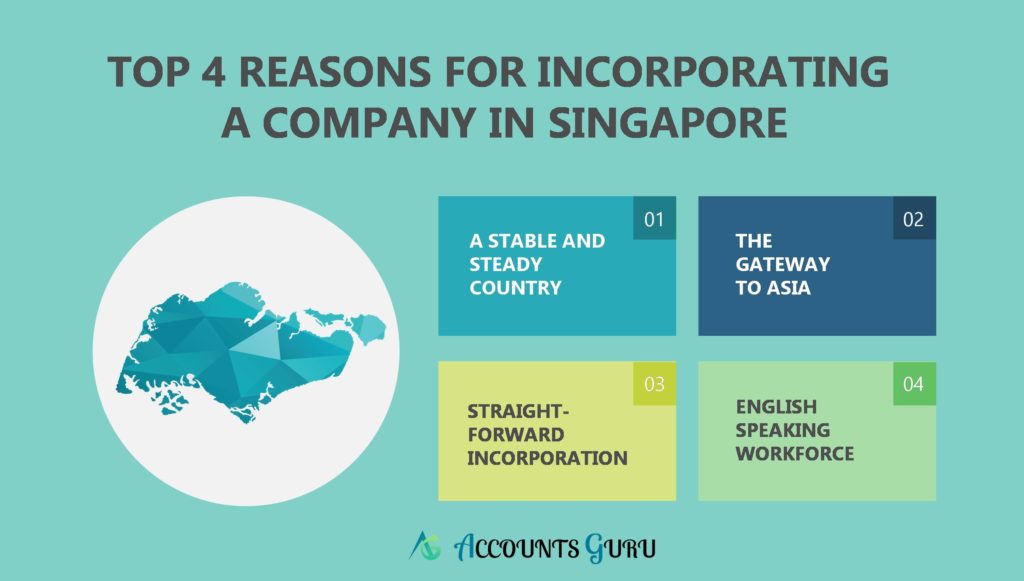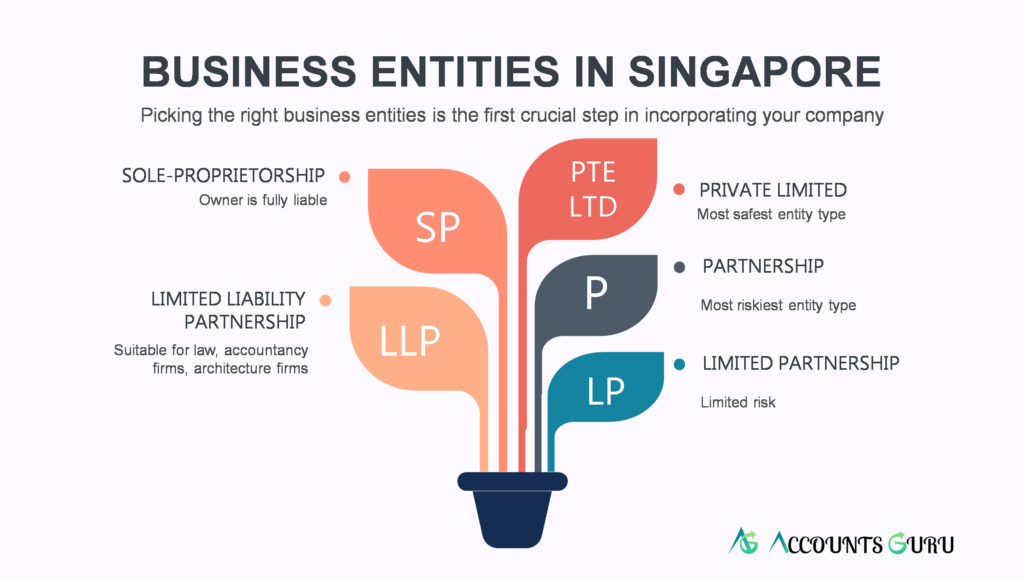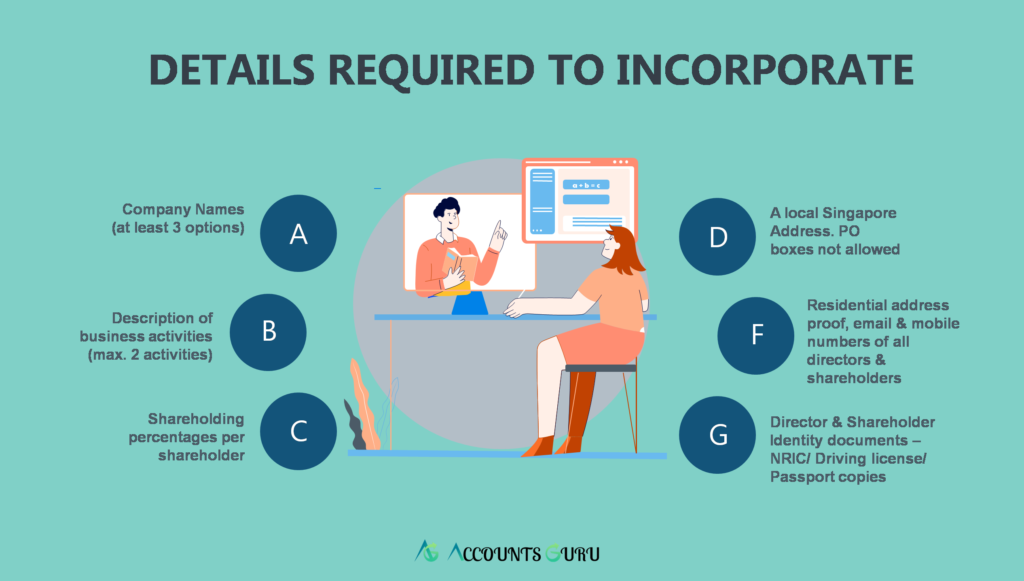A COMPREHENSIVE GUIDE TO
INCORPORATING A COMPANY IN SINGAPORE
INTRODUCTION
We get it. Starting up a business can be overwhelming. There are various aspects to juggle, from financial and operational aspects to marketing and legal works, including company incorporation and This blog offers entrepreneurs and business owners like yourself a comprehensive guide to incorporating a company in Singapore. You’ll learn along with all the requirements and. This article also covers the guide for as we are professionals able to take care of your company’s incorporation!
We’re just a video call away
Not sure of which business entity will suit your business?
Or need more information about what documents are needed by ACRA?
Book a free consultation with us today!
WHY DO PEOPLE INCORPORATE A COMPANY IN SINGAPORE?

A stable and steady country
Being one of the most stable economies in the world, Singapore attracts foreign entrepreneurs to set up their companies. Singapore’s company law makes it a very easy country to do business in. In fact, according to the Singapore Economy Development Board, it is second in the world.
It is also number one in Asia in terms of intellectual property protection (Sustainability Cities Index). The country has no debt and has a subsidy system in place for housing, health care, and education. All of these factors make Singapore a robust country.
The gateway to Asia
Singapore is strategically located at the center of Southeast Asia. It’s just a few hours plane ride to its neighboring countries like Indonesia, Malaysia, and China. Its geographical location makes Singapore’s airport and ports the top shipping hubs in the world with almost 220 shipping lines.
Straightforward incorporation
The straightforward procedures and requirements make company incorporation in Singapore business-friendly.
English speaking workforce
English is the primary language spoken in Singapore, making the country competitive globally. Almost every Singaporean speaks English. On top of that, thanks to the advanced educational system, Singapore’s workforce remains credible and reliable.
PICKING THE RIGHT BUSINESS ENTITY

Once the documents are prepared, the next important thing to do is to choose the right type of business entity. This determines the extent of personal liability, the loan you can take, and the paperwork that is required to do. So a few things to keep in mind before selecting the entity type are:
– How many directors and shareholders there are in the company?
– The legal status and/ or risk
In this article, we explain the five most common business entities in Singapore.
Sole-proprietorship
Suitability: for low-risk businesses run by individuals
Legal status: not a separate legal entity
Taxation: At the owner’s personal tax rate
This is a business that’s led and owned by one person. It’s the simplest type of business entity. The owner is entitled to all the profits and debt. From the legal perspective, there is no separation between the business owner and the business entity.
Entrepreneurs should note that there’s a risk for this business type as it has unlimited liability. This means that if you can’t pay the obligation, creditors can come after your personal assets. Hence, it’s suitable for low-risk businesses with no partner.
Any Singaporean/ Singapore Permanent Resident/ EntrePass holder can set up this type of business. However, a foreigner must appoint a local manager to incorporate this type of business entity.
Limited Liability Partnership (LLP)
Suitability: for law, accountancy, architecture firms
Legal status: a separate legal entity.
Taxation: profits are taxed at partners’ personal income tax (if individual)/ corporate tax rate (if corporation)
LLP is a marriage between partnership and Private Limited entities. There’s no limit on numbers of Partners. The biggest difference between the two is that the LLP partners are taxed at their individual personal tax rate and are not eligible for tax exemption.
This business model allows a separation between the business owner and the business entity, meaning that each partner is solely liable for the debts/ loss that occurs due to their own actions. One partner can do a business contract without the approval of the other partner.
Any foreign and local individual can set up a LLP entity. It requires at least 2 partners and one local manager to set up.
Private Limited (Company)
Suitability: for all industries
Legal status: a separate legal entity
Taxation: at corporate tax rate
This is the most ideal and popular business structure in Singapore. From the legal perspective, the company has its own legal entity separated from its partners. The owner has limited liability to the extent of unpaid shares held by them. Personal assets of the owner are protected. It requires at least one director and one shareholder. You may appoint one person to be registered as the director and the shareholder.
Another benefit of this business entity is unlike other types, you can. In the first three years upon the incorporation of the company, there’s a 75% of tax exemption. This applies to the first S$100,000 of income. For the next S$100,000, there’s 50% exemption. A private limited company has a lower risk in terms of liability. This entity requires a local director.
Partnership
Suitability: for small-scale business models with low risk and returns. It’s an association of two to twenty people maximum wanting to register and operate a business
Legal status: it’s not a separate entity. Partners have unlimited liability and are responsible for each other’s debts and losses.
Taxation: Profits taxed at partners’ personal income tax rates.
Singapore citizen/ Singapore permanent resident/ EntrePass holder can set up the business with any other individual. Foreigners wanting to set up a partnership have to appoint an authorized representative who is either a Singapore citizen/ Singapore permanent resident/ EntrePass holder. Partnership business license has to be renewed every year or at most every three years on case to case basis. Cannot own property in firm’s name.
Limited Partnership
Suitability: for small-scale business models with low risk and returns. It’s a partnership consisting of two or more persons with at least one general partner and one limited partner.
Legal status: It’s not a separate entity. General partners have unlimited liability. Limited partners have limited liability and are responsible for each other’s debts and losses.
Taxation: Profits taxed at partners’ personal income tax rates (if an individual)/ corporate tax rate (if a corporation)
Singapore citizen/ Singapore permanent resident/ EntrePass holder can set up the business with any other individual. Foreigners wanting to set up a partnership have to appoint an authorized representative who is either a Singapore citizen/ Singapore permanent resident/ EntrePass holder. A Partnership business license has to be renewed every year or at most every three years on a case to case basis. Cannot own property in firm’s name.
DETAILS REQUIRED TO INCORPORATE

Below are the details you need to prepare before starting the process of incorporating a company in Singapore:
1) COMPANY NAMES: First things first, reserve a company name and ensure the name you want is available and not taken up. It’s recommended to prepare two to three options of the names that you prefer, just keep them handy. There are a few guidelines to be adhered to for selecting a company name:
A company name shall be unique and cannot be identical to any existing business in Singapore
A company name should not be offensive
A company name should not be prohibited by any government agency such as the Ministry of Finance
2) DESCRIPTION OF BUSINESS ACTIVITIES: The company can select upto two activities from the list available on ACRA website.
3) SHAREHOLDING PERCENTAGES: The company shares have to be distributed to each shareholder as per the ratio agreed among all shareholders. The ratio could be 50:50, 30:70, 5:95 etc, ACRA does not dictate how the shares can be split. Also the number of shares that can be allowed is not dictated by ACRA. A company can be started with as low as just one (1) share unto infinite number of shares.
4) REGISTERED OFFICE ADDRESS IN SINGAPORE: A physical local Singaporean address is needed for all types of companies at all times. A company cannot declare a P.O. Box or an overseas address.
5) CONTACT DETAILS: It’s mandatory to declare the latest contact details for all shareholders and directors. Physical address as well as mobile numbers and email address is mandatory.
6) Identification documents
For all shareholders and directors:
1) Passport copy for foreigners & employment pass holders
2) For Singaporean, Permanent resident and employment pass holders – the local Identity card
3) Proof of residential address (For ex: Rental agreement letter, recent utility bill, or bank statement) for all.
For corporate shareholders:
1) Certificate of Registration showing company’s name, registration number, registered address as stipulated in the Company Extract, and details of all directors and shareholders. This document is issued by Company Registrar from the country of its registration.
2) Identity document and proof of residential address of all its directors and shareholders.
3) Contact details of all the members of the companies e.g. directors and shareholders.
4) Details of activities that the Company is conducting.
5) Authorized Person Resolution.
6) Details of the UBO (Ultimate Beneficial Owners) and organizational chart.
STEP-BY-STEP GUIDE
Reserve a company name
The approval of the company’s name has to be obtained from ACRA. If the name complies with ACRA’s guidelines, approval should be obtained within a few hours. However, if certain words like ‘law’, ‘finance’ or ‘bank’ are part of the name, further approval from relevant authorities will need to be procured. As such, if you want the name of your company to be approved ASAP, we recommend that you avoid the usage of such words. A full list of these words can be found here. Once approval has been received, incorporation of the name has to occur within 60 days which is the amount of time for which the name is reserved. If the company name hasn’t been incorporated by then, the approved name will be available for others to reserve. Thus, it is recommended to immediately incorporate the name of the company once the name is approved.
Appoint the company’s directors and shareholders
For every registered business in Singapore, there must be a minimum of one local director. This person can be a Singaporean, PR, Entrepass holder or Apart from this one local director, the company may appoint as many other directors as they like. There is a list of criteria that the local director will be stipulated with. He or she cannot be younger than 18 years of age, cannot have been convicted in Singapore of any offence connected to the formation or management of a corporation, or of fraud and/or dishonesty. There is a limit of 50 shareholders for each company. Shareholders may be foreign or local individuals or entities.*EPHs have to obtain a letter of consent from the Ministry of Manpower (MOM).
Decide the shareholding structure
There are a few classes of shares:
1) Ordinary Shares
Ordinary shares usually carry one voting right and each shareholder receive the dividends equally. When the company is closed down or liquidated, the ordinary shareholders would have a share in the company’s residual assets. Ordinary shares are the most common class of shares.
2. Non-voting Shares
For these types, the shareholders don’t have the voting rights and can’t participate in the Annual General Meeting (AGM). It is usually issued to family members and employees.
3. Redeemable Shares
These types of shares are issued with the terms and conditions that in the future the company may or will buy them back in the future at a certain date. Hence, when the date comes, the shareholders are required to sell their shares back to the company.
4. Preference Shares
The shareholders of this type of shares are entitled for a fixed dividend, and they usually receive payment before ordinary shareholders. Most often, the shareholders are not entitled the voting rights.
5. Management Shares
Management shares are usually held by directors of a company and the shareholders are entitled the voting rights. Depending on the arrangement, management shares may come with one or as many as 10 votes each.
Select a maximum of two business activities
During the incorporation, you will be asked to pick and submit an SSIC (Singapore Standard Industrial Classification) code. This code identifies your future business entity as a clinic, restaurant, or tuition center. You may select two business activities. Click to search for the SSIC code for your company.
Apply for a business license if needed
For businesses that need a license (e.g. health clinics, F&B businesses), the company can only be registered after the appropriate license is obtained. The exhaustive list of industries that require a license can be found here
Appoint a corporate secretary
The secretary should:
a) Be a local resident in Singapore
b) Not be the sole director of the company and;
c) Be qualified to be a company secretary.
The core duties of the company secretary are:
a) Holding the annual AGM
b) Organizing board meetings for passing other resolutions time-to-time
c) Filing the annual returns
Our company provides Corporate Secretary Services to ease your paperwork. Hence you can focus on growing your company.
WHAT NEEDS TO BE DONE AFTER THE COMPANY IS INCORPORATED?
Once incorporation is completed, there are a few other things to complete
Open a corporate bank account in a bank of your choosing
It’s imperative to select the right bank that suits your business needs. A few things to consider before picking the bank are the additional financial services your business may need, the average minimum monthly balance to be maintained at the bank, and the funding/ loans you may apply for.
Register for Goods and Service Tax (GST)-if needed
It’s important to register for GST by predicting the future turnover and not wait for the turnover to cross the SGD 1 million mark. Companies are liable for penalty if they fail to predict the turnover and register for GST.
Companies can also register for GST voluntarily even if they have just incorporated or if they have not reached the SGD 1 million turnover mark.
INCORPORATE A COMPANY IN SINGAPORE AS A FOREIGNER

Here’s what you need to know about starting your own business here.
The good news is a foreigner can incorporate a company and have 100% of the shares. However, there are two requirements to comply with. First, you need to appoint a local director. This local director shall be a Singaporean, Permanent Resident, or EntrePass holder. Secondly, you need to engage a registered filing agent to register your company.
There are several ways to appoint a local director. You may employ a Singaporean/ PR/ EntrePass holder and appoint them as the local director. Another way is to apply for EntrePass which makes you eligible to appoint yourself as a local director. The last option is to appoint someone a nominee director. However, prepare the paperwork to allow only yourself to be the bank signatory.
Business Entity for Foreign Companies
There are three business entities to choose from. The key difference between these three is the legal business structures.
Subsidiary Company
A subsidiary company has a similar legal entity with Limited Liability Company. A subsidiary company is a separate entity from is parent company. Which means the parent company is not liable for the subsidiary company’s debt and losses. It’s only limited to its share capital. One of the biggest benefits is 100% of the shares can be owned by the parent company. One employee is required to be relocated to Singapore to take charge of the company in Singapore. The employee will need an Employment Pass to work in Singapore.
Branch Office
A branch office is an extension of its parent company. To do business activities and structure, the branch office has to refer to the parent company’s Memorandum and Articles of Association (MAA). It’s required to have one resident in Singapore for the branch office. A branch office has the same legal entity as its parent company. Which means the parent company is liable for any debts and losses when it occurs from the branch office.
Representative Office
A foreign company may wish to do a survey and research prior to investing and establishing a company in Singapore. They can opt to register a representative office. A representative office can not do any business activities and does not have legal status.
